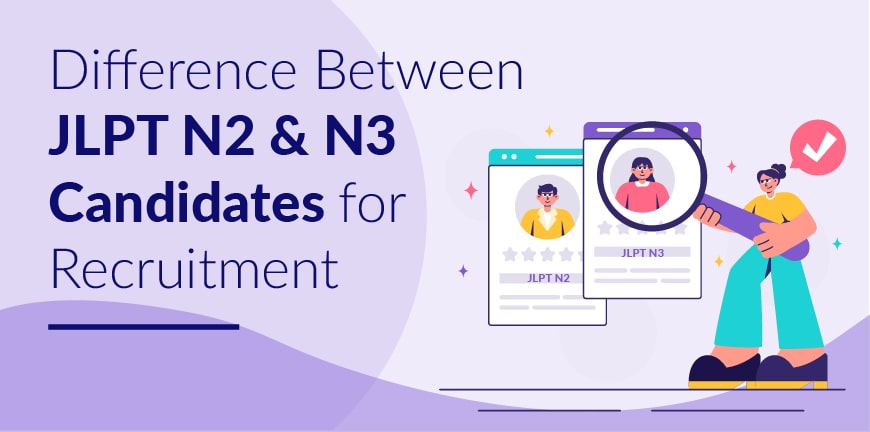
What Is GST Compliance? Meaning, Checklist & Benefits
11/07/2025
Project Staffing: What It Is, How It Works, and Benefits
16/07/2025- Understanding JLPT N2 & N3: Key Differences
- Impact on Professional Communication and Workplace Readiness
- Role Alignment: What Types of Jobs Suit N2 and N3 Candidates?
- Salary Expectations and Career Progression Paths
- Visa Eligibility and Opportunities for Relocation to Japan: N2 vs N3
- Employer Expectations: What Recruiters Look for Beyond Certification
- How ALP Supports JLPT N2 and N3 Aspirants with an End-to-End Career Development Program?
- Key Takeaways
- Frequently Asked Questions (FAQs)
Japan has emerged as a hot destination for candidates seeking a career overseas. The main reason behind this is that Japanese companies are offering lucrative career options and high-standard life for overseas professionals to compensate for their severe labour shortages and fuel their growth initiatives. One of the basic requirements for landing a job in Japan is N3 and N2 level JLPT certification.
Although possessing a high-level JLPT certificate is not a non-negotiable mandate, Japanese companies, from a broader perspective are prefer candidates with a minimum of N2 or N3 level certification so that they can have smooth internal communication and get things done without extensive supervision and support.
However, the level of Japanese language proficiency plays the role of a guiding torch in helping Japanese companies make informed decisions on the type of roles and responsibilities to be given to the selected overseas candidates.
Let’s go through the subtle differences between N2 and N3 level certified candidates in terms of their suitability to work for Japanese companies that use the native language as the standard mode of communication.
Understanding JLPT N2 & N3: Key Differences
The Japanese-Language Proficiency Test (JLPT) certification is a popular language assessment tool used by Japanese companies to determine prospective overseas candidates’ command of Japanese. The 5 levels of the JLPT certification exam include:
- N5: Basic Level: This is the easiest level, where candidates are required to understand basic Japanese that includes simple expressions and phrases.
- N4: Elementary level: It’s an upgrade from N5, where candidates gain proficiency using Japanese in everyday situations.
- N3: Intermediate level: It’s a bridge level where Japanese language proficiency reaches a professional level, ideal for communication in both the office and daily life.
- N2: Upper intermediate level: It’s a pre-advanced level where candidates can communicate with Japanese native speakers with relative ease.
- N1: Advanced level: It is the most difficult level, where candidates must communicate at almost a native speaker level.
Among 5 levels, Japanese companies typically seek overseas candidates’ profiles with the N3 and N2 level certifications, as it’s adequate for regular and technical communication within office premises.
Key Features of JLPT N2
- Grammar & Vocabulary: Here, candidates must be able to point out1,000 symbols of Kanji & identify approximately 6,000 vocabulary words.
- Listening: Candidates must understand routine and technical conversations under different circumstances. They must be able to grasp most of whatever ideas shared by their Japanese counterparts and interpret them promptly to take the right actions.
- Reading: Candidates must be able to read newspaper articles, billboards, reports, etc., with relative ease.
Key Features of JLPT N3
- Grammar & Vocabulary: Here, the expectation is to point out 1650 symbols of Kanji & approximately 3,750 vocabulary words.
- Listening: The candidates must be able to comprehend everyday situations that occur in the office or social life.
- Reading: The candidates must be able to read simple columns in the newspaper, short stories, and news announcements.
Here is the table that shows the key differences between JLPT N2 and N3 candidates required for workplace communication:
| Criteria | JLPT N2 Candidates | JLPT N3 Candidates |
| Proficiency in Native Language | Can manage complex conversations, client meetings, and draft emails in the native language with high fluency. | Can manage routine workplace conversations and comprehend certain informal interactions. |
| Workplace Readiness | Ready for direct client communication, reporting, and documentation in Japanese. | Suitable for internal support roles with limited Japanese language demand. |
| Role Suitability | Fit for customer-facing, project coordination, or on-site roles in Japan. | Fit for backend, documentation support, or assistant roles under supervision. |
| Autonomy in Communication | Can work independently in a Japanese-speaking environment with minimal guidance. | Requires supervision and language support in most work situations. |
| Recruiter Preference | Highly preferred by Japanese employers for immediate deployment or client projects. | Considered for entry-level roles with scope for language upskilling post-hiring. |
Impact on Professional Communication and Workplace Readiness
Certain Japanese companies where native and overseas workers perform similar tasks may prefer communication in the native language rather than bilingual. In such work premises where Japanese communication is the modus operandi, language proficiency becomes non-negotiable.
Candidates with N2 calibre are usually capable of running smooth communication with their Japanese colleagues. They are also adept at holding their own in internal meetings & reviews, independently creating & replying to email queries, preparing documentation, and providing reports. Their business-level vocabulary & Keigo (honorific language) illustrations allow them to have smooth to-and-fro communication with native clients, participate in decision-making discussions, & prepare documents in Japanese without much supervision.
On the other hand, JLPT N3 candidates have certain limitations when it comes to communicating in complex situations. They can grasp and participate in casual workplace conversations & follow instructions.
However, they may struggle with complex communication, especially in critical or formal situations. They often require translator support for interpreting emails, understanding reports, or communicating with Japanese stakeholders.
For example, in a client meeting, an N2 candidate can take notes, respond to queries, and summarise outcomes in Japanese. On the other hand, a candidate at the N3 level might only follow the discussion partially and need a native speaker to interpret or clarify key points.
Similarly, while N2 candidates can write business emails and maintain communication threads whereas N3 candidates may rely on templates or translator assistance. These differences significantly influence their readiness and suitability for specific roles in Japanese organisations.
Role Alignment: What Types of Jobs Suit N2 and N3 Candidates?
The job roles ideal for JLPT N2 & N3 certified job seekers in Japanese-based firms vary based on language skills and the role-specific complexities. Just having language skills and no real credentials in project execution from a technical standpoint may not work for job profiles that require both communication and technical acumen. Therefore, a balance of language skills & technical expertise is essential to maximise the potential of a candidate and get the best outcomes. Here are the job roles suitable for N2 and N3 candidates.
JLPT N2 Candidates
- Apt for roles such as client coordination, business development, project coordination, and interpretation.
- Commonly placed in industries such as IT, manufacturing, engineering, automotive, and consulting.
- Strong candidates for onsite roles in Japan due to their ability to work independently in Japanese.
JLPT N3 Candidates
- Fit for support roles such as documentation assistants, junior analysts, or coordinators under supervision.
- Recruited in sectors like BPO, logistics, or backend IT support.
- Primarily considered for offshore roles, with potential for future deployment after language improvement.
Employers view N2 candidates as more versatile and client-ready, capable of bridging communication gaps across teams. N3 candidates are often seen as emerging talent who can grow into advanced roles through continued language training and exposure to Japanese business practices. This staged approach helps companies build a scalable bilingual workforce.
Salary Expectations and Career Progression Paths
JLPT certification levels tilt the balance in favour of candidates with higher level proficiency when it comes to final selections and salary offered. N2-certified professionals usually can demand higher starting salaries due to their capabilities of handling complex communication, client interactions, and managing responsibilities independently.
On the contrary, N3-certified candidates mostly qualify for entry-level pay and are usually placed in support roles that require fewer interactions with the Japanese contingent.
Career progression for N2 holders is faster, with opportunities for managerial roles, onsite assignments, and leadership positions in Japan-focused projects. N3 professionals follow a relatively meagre-paced path but can propel their career by transitioning to N2 and above via further training.
However, transitionally from JLPT N3 to N2 can be a game-changing move as it may result in promotions, a higher salary package, and better career progressions.
Here is a comparison between N2 and N3 levels in terms of average salary and transition from N3 to N2.
| Proficiency Level | Job Role Examples | Monthly Salary (INR)
Approx |
Monthly Salary (JPY)
Approx |
Remarks |
| JLPT N3 | Documentation Assistant, Support Analyst, and Coordinator | Rs 30,000 – 60,000 | ¥180,000 – 250,000 | Entry-level roles, limited Japanese usage, require supervision |
| JLPT N2 | Project Coordinator, Business Analyst, and Interpreter | Rs 60,000 – 1,20,000 | ¥250,000 – 400,000 | Mid-level roles, able to handle client communication, reporting, and documentation |
| N3 → N2 Transition | After 1–2 years with training and certification | Rs 80,000 – 1,50,000 | ¥300,000 – 450,000 | Promotion to client-facing or onsite roles |
Visa Eligibility and Opportunities for Relocation to Japan: N2 vs N3
From the perspective of relocation and work visa eligibility, JLPT N2 candidates’ prospects of landing a lucrative job in Japan are more than N3 candidates. Although Japan’s immigration policies don’t mandate JLPT certification, employers strongly favour N2-level candidates.
The reasons behind this inclination include the ability to handle business communication, prepare documentation, and clean communication with their Japanese counterparts. These attributes increase visibility for N2 candidates and make them more likely to receive job offers with visa sponsorship for the long term.
On the other hand, JLPT N3 candidates will get approval on work visas but may face more hurdles in securing a job that offers substantial compensation. They usually land support roles and may need to engage with a bilingual team or undergo language training post-deployment.
Most N3 candidates are first placed in offshore roles, with relocation considered only after further upskilling or promotion.
In short:
N2 = Immediate visa readiness + client-facing/onsite roles
N3 = Conditional eligibility + offshore-first approach
Upgrading from N3 to N2 significantly boosts not only visa chances but also integration into Japanese corporate and social culture.
Employer Expectations: What Recruiters Look for Beyond Certification
Just JLPT certification will not be enough to secure a job in Japan, although it can tilt the balance in favour of a prospective candidate. Most Japanese-based firms look at a holistic picture before offering a job. Along with JLPT certification of N2 or N3, Japanese companies seek:
- Cultural Acumen: A keen understanding of Japanese work culture dynamics, office etiquette, communication standards, acknowledging hierarchy, and ready to contribute as a team player.
- Soft Skills: Politeness, punctuality, keen attention to detail, flexibility, loyalty, and adaptability are highly valued.
- Practical Application: Ability to use Japanese in real work scenarios, from emails, meetings, to client interactions.
- Bilingual Proficiency: Strong English and Japanese skills are essential for roles in global or cross-functional teams.
- Problem-Solving in Context: Recruiters prefer candidates who can think critically and communicate effectively in both languages.
How ALP Supports JLPT N2 and N3 Aspirants with an End-to-End Career Development Program?
Instead of just randomly enrolling on N2 and N3 exams and hoping some Japanese companies will take notice, it is always a better approach to enrol in a career development program that offers both language training and job opportunities in one single platform.
ALP Consulting, a leading bilingual recruitment agency, offers an end-to-end career development program for graduates and working professionals seeking a lucrative career in Japan. The career program is structured, and the main objective is to help candidates secure a career and get settled in Japan for a long duration. The steps encompassed in ALP’s career in Japan program include:
Step 1: Internship Opportunity
Once the candidate clears the N4 level and completes graduation, ALP will offer an internship/apprenticeship of 4-6 months. The same is applicable for working professionals looking for career opportunities in Japan.
Step 2: JLPT-N3 Level Training
ALP will train candidates for the N3 level training, ensuring communication levels reach a professional level.
Step 3: Job Interviews with Japanese Clients
Once candidates complete the internship and the N3 level certification, ALP will coordinate and set up interviews between Japanese clients and prospective candidates.
Step 3: Advanced Language and Cultural Training
Once a candidate gets selected to work for Japanese clients, ALP will provide training for N2-level communication, Japanese work culture, and client-specific skills. This will be done during the visa processing period, which will be around 2-3 months.
Step 4: Visa Assistance and Onboarding Support
ALP will provide work visa assistance for candidates and onboarding support to facilitate a smooth transition towards life and career in Japan.
Key Takeaways
- JLPT N2 is preferred for onsite, client-facing roles with higher salary and independence.
- JLPT N3 suits support roles, with potential for relocation after further language upskilling.
- Employers seek cultural fit, soft skills, and bilingual ability beyond JLPT certification.
- N2 certification enhances visa eligibility and smooth integration into Japanese corporate environments.
- ALP offers structured training-to-placement programs for N3/N2 aspirants targeting long-term careers in Japan.
Frequently Asked Questions (FAQs)
1. Is JLPT certification mandatory to get a job in Japan?
Not mandatory, but most Japanese employers prefer candidates with at least N2 or N3 certification for smoother communication.
2. What’s the main difference between JLPT N2 and N3 in the workplace?
N2 candidates handle business communication independently, whereas N3 candidates need support for formal interactions and written communication tasks.
3. Can JLPT N3 candidates get jobs in Japan?
Yes, but usually in support roles with offshore placement initially and relocation considered after further language upskilling.
4. How does JLPT level affect salary expectations?
N2-certified candidates command higher salaries due to advanced communication skills, whereas N3 candidates typically earn entry-level compensation.
5. How does ALP Consulting support JLPT candidates?
ALP provides language training, internships, interview coordination, visa assistance, and onboarding support for careers in Japanese companies.
Contact Us For Business Enquiry

Suresh Ramkrishna
Suresh Ramkrishna is the Operations Manager at Alp Consulting Ltd., with over 30 years of extensive experience spanning recruitment operations, sourcing, supply chain management, and client relations. At Alp, he leads the Search & Staffing Practice, specializing in bilingual and niche skill hiring while overseeing Japanese language and TITP (Technical Intern Training Program) initiatives. He also manages NAPS (National Apprenticeship Promotion Scheme) training programs, fostering skill development and workforce readiness across industries. Previously, he spent over two decades in the apparel export industry, managing vendor development and international sourcing for top global brands. Suresh’s leadership blends strategic talent acquisition with operational excellence across diverse industries.




